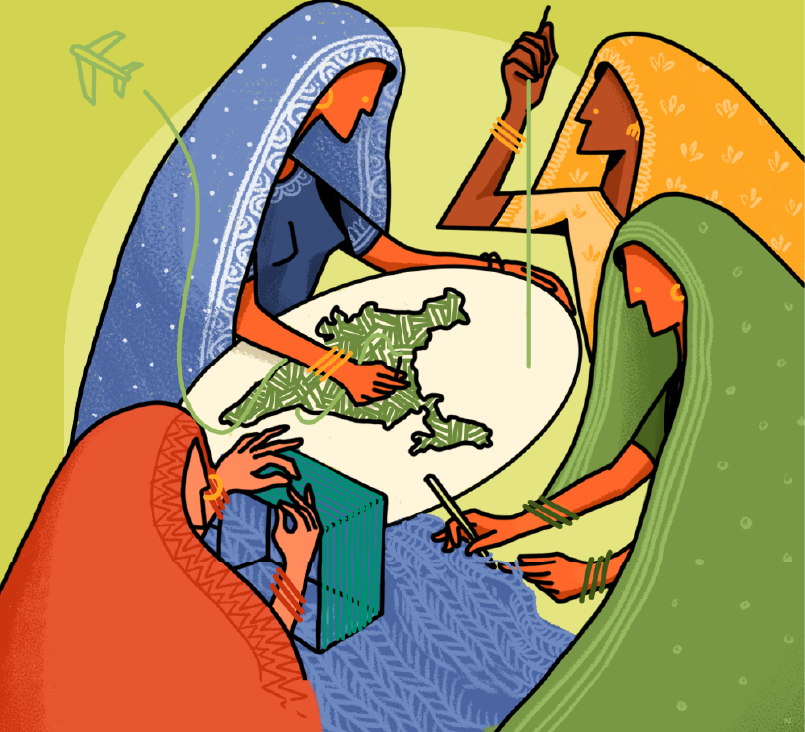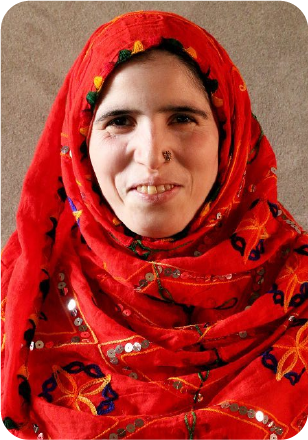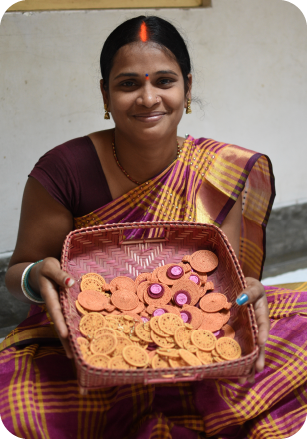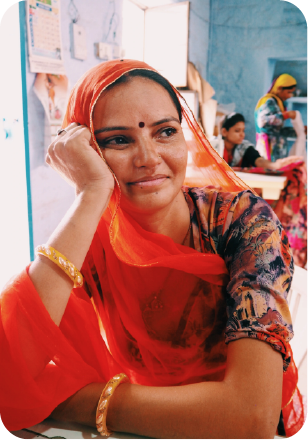In the previous article of Blur The Border, we introduced you to three remarkable female founders of social enterprises Saheli, Samoolam, and Sirohi. Through textiles and craftsmanship, they have economically empowered less-privileged women and elevated their work to global consumers. However, the inspiring journeys of Madhu, Usha, and Gauri also raised essential questions, such as why they chose textiles as an ideal medium for empowerment. Additionally, how can the revival and globalisation of the crafts keep them relevant in a landscape dominated by fast fashion? With these conversations and more, we also discovered how we could collectively contribute to its future survival.
Fostering women's empowerment through craftsmanship
When one of the first artisans at Sirohi, Gauhar Fatema agreed to create the first set of Charpais for the brand, she preferred to work behind the closed doors of her home. Like Gauhar, many women in rural parts of India are still confined to their homes and denied the right to work outside. Today, however, she confidently conducts workshops and gives interviews, and more than 550 female artisans at Sirohi have followed her into weaving a financially independent future for themselves. “The cultural barriers have slowly started dwindling because the women are now coming to our factory to collect raw materials. Their husbands are joining too because they are earning more money,” says Gauri Malik, founder of Sirohi, highlighting the confidence amongst the artisans today and that apart from the brand’s success, this remains the most amazing part of the journey. Other founders share similar viewpoints. "Before I could empower the women, I had to empower men to let them step out of their homes" recalls Usha, further explaining that through employment, the women of Samoolam have realized that they don't need to remain dependent. She continues to describe an incident involving infidelity with one of the women at Samoolam and how the community confronted it bravely. “So, I feel that it's not just about economic empowerment now, it's about being empowered mentally, the freedom, and feeling the self-worth”. Usha concludes. Meanwhile, Madhu sheds light on the transformative journey of the women of Saheli, and how this journey is not hers alone, but also of several women there who broke cultural norms and taught themselves. “Today, I look at them confidently taking the lead, assisting our visitors without me needing to guide them. They are handling order sheets that are typically written in English and it fills me with immense pride," she concludes.
Unlike other domains, crafts do not pre-requisite a formal education. Rather, it stands out as an optimal choice. “If you are giving them jobs that aren't based on their level of education or skill, or outside their comfort zone, I think it is a lot more challenging. So I think craft enables women to do what they can do and do it in a more dignified fashion”, adds Gauri. Crafts are also an alternative for many women who need to balance household chores and childcare responsibilities on an everyday basis. It enables them to pursue income generation - oftentimes with higher pay- without adding excessive burdens to their already demanding roles. “That's how Samoolam started. I thought of picking up a craft skill, which is not very labour intensive, not very movement, or raw-material intensive; something which the women can carry with them while taking a break from farming or when they are feeding their baby”, says Usha.
Regardless of the rapid technological development today, the rich heritage of Indian crafts and textiles has evolved as a force of transformation; causing a ripple effect across families, communities, and the upcoming generation for a more equitable and brighter future. “I don't see ourselves as an artisan-based organization. Sustainable garments, and textiles become a way for us to achieve female empowerment,” adds Madhu. For 12 years, as the founder of Saheli, Madhu observed that when money enters a woman's hands, its value multiplies, reshaping the dynamics of power. Economic independence amongst these women has led to a reduction in domestic violence, in stark contrast to previous years.
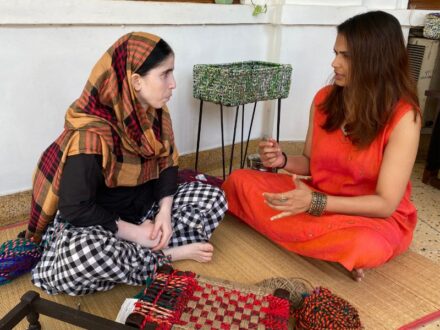
"When a product bears a human touch, its value triples, so with traditional crafts, I believe the reward is more emotional than transactional, as compared to fast fashion brands. But we still need to build that perception in India"
- Gauri Malik, Founder-Sirohi
The revival of textiles, craftsmanship and their journey of globalisation
Even so, their relevance compared to fast fashion brands remains of significant concern. But Gauri asserts, “I don't think we can compete with fast fashion brands anyway because of the quantity they can produce. In terms of gratification, however, I think both are very different. When a product bears a human touch, its value triples, so with traditional crafts, I believe the reward is more emotional than transactional, as compared to fast fashion brands. But we still need to build that perception in India”. Over the years various reasons have emerged that have led to a drastic shift from traditional textiles and crafts. Gauri continues to highlight, she says, “Indian consumers are strongly influenced by Western products and hold a strong affinity towards the way international brands have been able to translate the aesthetics into their branding and catalogues. But interestingly, these products are bought from Indian artisans and sold back to us at international price points. Additionally, when it comes to Indian crafts and textiles, a lot of quality issues and obligatory purchases by consumers have also predominated for a while. To ensure that quality is maintained throughout the products, we first need to encourage a sense of ownership in the new community of artisans and take pride in their craft, something that is more fundamentally inherent amongst generational artisans.”. The textile and crafts sector has also witnessed the community of generational artisans diminishing each year -overthrown by globalization that values mass-produced versions more than handcrafted ones that take time, effort, and years' worth of skills. In light of this situation, Usha reflects on her shift away from traditional artisans. “Much of the design education focuses on well-known craft and artisan sectors, with very few addressing communities at the bottom of the pyramid, such as the unskilled workforce. So, when I came back to India in 2008, after having worked with several craft communities and NGOs, I wanted to work with women who have fallen back due to globalization- such as agarbatti makers, potters, farmers", she explains. Today, the crochet-focused jewellery brand is available on platforms like Etsy and has had successful collaborations with Good Earth, Jaypore, and Fab India. The brand has come a long way from 2008, a time, as Usha recalls, when crochet wasn't widely regarded as a practical accessory.
"I have learnt that dreams are never fulfilled alone. I wanted to build a mobile organization that functions by itself and the women of Samoolam have walked in this dream with me - together in our ups and downs and during financial strains.."
- Usha Varia, Founder-Samoolam
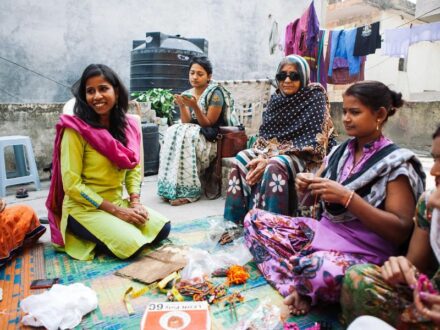
Government and entrepreneurial initiatives for the upliftment of craftsmanship
Balancing modern consumer demands has become crucial to granting these invaluable crafts the global recognition they deserve. Madhu reflects on such transformations at Saheli, “The women at Saheli came with little knowledge but showed determination to learn and excel. Today they are adapting their skills to meet the high standards of the Western market, which demands perfection and rejects imperfections”, she says. Meanwhile, there is also a broader role that needs to be played in this revival process. Madhu continues to highlight, “I believe skill development is a key tool for our country at the moment and should be included in the education curriculum.” Gauri also reflects on the importance of taking self-initiative, “The government is doing a lot in favour of reviving the crafts and the artisans. There are several schemes, grants, and funding available today for the artisans. It’s we who aren’t aware and its education is not formalised or segregated. Maybe if we have better systems and platforms with better access to such information, it would be easier. And people also need to take time out and understand what exists for them.” Usha contemplates the future is in the hands of the upcoming generation, “The idea behind Samoolam is to create a ripple effect. Often, the youth of our country want to contribute to social work but mention that certain responsibilities hinder them. I want to convey a message that you don't need to commit your entire time to an NGO. Instead, you can utilise your skills intelligently to build a sustainable business model, where you get to make a living while simultaneously fostering the growth of others. When everyone dedicates themselves to the bare minimum and plays their part, we will eventually no longer need large corporations to generate employment opportunities for artisans”.
"The women at Saheli came with little knowledge but showed determination to learn and excel. Today they are adapting their skills to meet the high standards of the Western market, which demands perfection and rejects imperfections."
- Madhu Vaishnav, Founder-Saheli Women
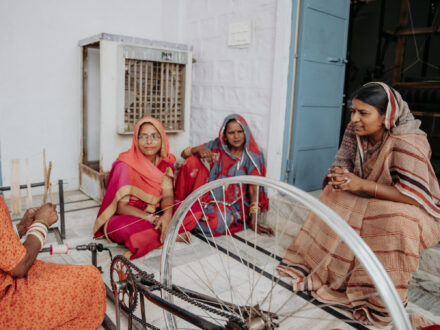
A two-way journey of transformation and inspiration
During their compelling journeys, the founders of Sirohi, Samoolam and Saheli have also gained valuable insights from the artisans. Usha highlights the importance of teamwork. She says “I have learnt that dreams are never fulfilled alone. I wanted to build a mobile organization that can function by itself and the women of Samoolam have walked in this dream with me - together in our ups and downs and during financial strains. These things keep me motivated and I learned that in all hardships, you just have to keep going.” Gauri talks about navigating the challenges with a positive attitude, “I've learnt to be persistent, not complain and go on because I work with women who have always been told what to do all their lives, who have only just had dreams even if it's as simple as going to NIFT. We live in an age where everything is available to us in a click but some of the women aren't allowed access to that. If they can break such barriers, take care of the house, and the kids, deal with ten other things and still come to work, I think I too can learn to accept the challenges and find joy in the little things read.” Meanwhile, Madhu expresses how her experience in the village of Bhikamkor has been a source of personal growth and learning, “The village taught me humility and made me humble. I always say I don't work for monetary gains, I work for female empowerment. But in return, they have also empowered me so much. I learned a lot about life, about womanhood and motherhood.”
